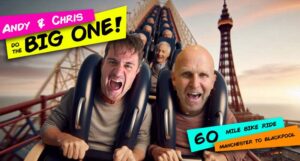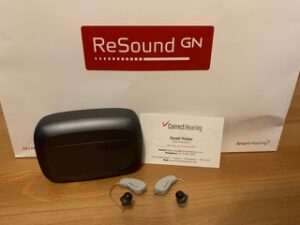We met a lovely lady from Northern Ireland at a Molly Watt Trust ‘In it Together’ event in Edinburgh in October 2015, she has been a hearing aid user since she was 4 years old and was managing very well.
At that particular event we were very fortunate to have a presentation from GN ReSound’s Graham Roberts who was able to share with us the many impressive hearing aids and products available from the supplier.
That presentation together with Molly’s in depth and ongoing testimony of her GN ReSound LiNX² and how they have enhanced and enabled her life led to an influx of enquiries about how and why these enabling smart aids are not available to those living with Usher Syndrome (deafblindness), particularly as they offer far more than most hearing aids provided by the NHS.
It is fair to say everybody at that event, particularly those using hearing aids where very interested in the enablement smart hearing aids can provide.
Molly coped with standard Phonak hearing aids provided by the NHS until she was 20 years old, however, from 14 years old when she became registered blind, deafblind she struggled and the reason for this in the main was because of her blindness.
For 6 years Molly insisted her hearing had deteriorated even though test after test showed her hearing, thankfully remained stable.
In actual fact what had happened was her ability to lipread, to use facial expression and body language had gone along with her sight, her ability to access sound and communicate had dwindled, demonstrating just how much the deaf rely on their eyes to hear. In other words she could no longer ‘fill in the gaps’ that her eyes had enabled.
It is a fact that the deaf hear with their eyes.
GN ReSound LiNX² provide a hearing experience those who have experienced really benefit from. They provide an incredible clarity of hearing, they enable directional sound meaning that whilst Molly is blind she can now turn towards a sound, something she could not do with her NHS provided Phonak hearing aids, she can also identify not just where sounds are coming from but most importantly she knows the sounds of danger – just imagine how important that is to safety for the deafblind.
These hearing aids have incredible bluetooth connectivity to iPhone and applewatch, also android devices giving the ability to many deafblind to access aurally things they could only dream of previously. Using a telephone as a telephone for the first time ever is most certainly a huge positive.
Not only can they be adjusted be independently adjusted but enable a very personal hearing experience and in so doing bring great confidence and independence.
Our friend from North Ireland was one of many desperate to have access to GN ReSound LiNX² and indeed has asked her NHS audiology department, their response was somewhat bizarre – an appointment with the Cochlear Implant Clinic!
Cochlear implant is amazing technology for the deaf, however, not only is it not for everybody it is also incredibly intrusive, expensive and most importantly not what the patient wants why not consider more enabling hearing aids which happen to be a fraction of the cost.
Figures suggest the cost of 1 cochlear implant would be close to the cost of 10 pairs of best quality smart hearing aids!
There are lots of people who have been hearing aid wearers a long time and like Molly have gotten on very well with them but now need more as Usher Syndrome/ blindness looms close.
GN ReSound have a variety of hearing aids including the ENZO2 for those with a profound hearing loss and whilst they are the creme de la creme of smart hearing aid technology their cost in comparison to cochlear implant is very reasonable.
Cochlear implant involves surgery, it is considered that deafblind people should have two implants to enable directional sound for safety and rightly so, directional hearing is a must for the deafblind, safety is imperative for all, whatever hearing aids worn.
Most get one implant at a time so often two surgeries after each substantial aftercare and rehab at huge cost.
I’m not saying this shouldn’t be the case, of course it should where appropriate, however not every deafblind person wants such invasive surgery preferring an alternate option.
Patients should always have a say in their care as it tends to be them who are the real professionals and who will have done the research based on their condition.
I know there is a long and in depth assessment for cochlear implant and so there should be but surely every patient’s individual requirements should be considered?
My friend in Northern Ireland was told there is a 3 year waiting list is this acceptable? Why not consider best hearing aid options?
We continuously hear that our NHS remains financially fragile, that it needs more funding but very rarely do we hear about solutions, about genuine savings that do not include reducing staff – surely this scenario has to be seriously considered
I would like to say our friend in Northern Ireland’s scenario is unique but sadly it is not!
Read 18540 times


